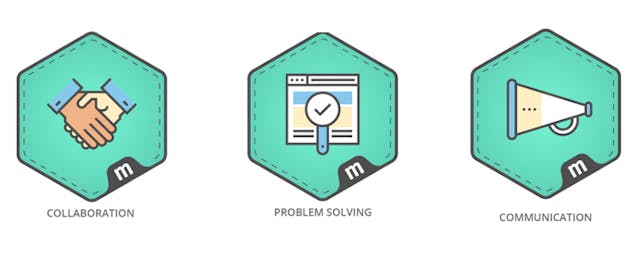When the U.S. Patent and Trademark Office granted two patents last year for creating, managing and tracking digital credentials, it raised new questions and concerns among a community of innovators who are trying to create an open platform for rethinking credentials.
That group of colleges, companies and nonprofits is working to build an openly licensed Open Badges platform for digital certificates that professionals and students can use to show they’ve mastered certain skills (either academic or so-called “soft skills,” like collaboration or problem solving).
Part of the reaction was disbelief, since the Open Badges platform was launched back in 2011 to great fanfare (it was originally called Mozilla Open Badges, but Mozilla has since transferred coordination of the standard to IMS Global Learning Consortium). Much of the funding came from grants from the MacArthur Foundation. How, they wondered, could a company claim to have just invented something that is so well known?
“The fact that it got granted is shocking,” said Kerri Lemoie, principal at OpenWorks Group, who has been involved in the Open Badges effort pretty much from the start. What the badges community built, she argues, should count as “prior art” (that's patent language for proof that an idea someone is trying to claim is not actually new). “These things have existed for a really long time,” she adds.
Originally, the curriculum and textbook giant Pearson filed for the pair of patents in 2017, on behalf of the online credential product it made at the time called Acclaim. The action caused criticism by some in the Open Badges community, and Pearson agreed that it would issue something like a waiver to anyone in the IMS Global community working on Open Badges. Technically, that waiver is called a RAND license (which stands for reasonable and non-discriminatory), and the goal was to say to the community that they could continue their work without fear of a challenge from Pearson.
But even before the Patent and Trademark Office came to its decision on whether or not to grant the patents, Pearson sold Acclaim to Credly, a company with a competing service. It’s worth noting that both Pearson and Credly had long been working with the Open Badges community.
The question in the Open Badges community now is, what will Credly do with its new patents?
A few representatives of the Open Badges community brought their questions directly to Credly and IMS Global during an online conference call in October.
Doug Belshaw, who is involved in Open Badges and now works for Moodle, asked why it was in Credly’s interest to hold the patents, and mentioned a recent decision by Microsoft to transfer some of its patents to what he called “community ownership.” Belshaw was referring to a move by the tech giant to help the Linux community by making tens of thousands of its patents open source. Why not do something like that with the credentials patents, he asked?
Credly’s lawyer, Ramtin Taheri, said that as a longtime patent attorney, he thought it good practice for companies to hold onto patents in case they ever need to use them defensively—if some other company comes along and claims to own an idea.
He insisted that Credly had no plans to assert its claims against anyone in the Open Badges community, and he said the company would honor the RAND license set up with IMS by Pearson.
“Credily is 100 percent committed to an open standard,” he said.
More recently, Credly has gone further to try to reassure those working on badges—specifically by broadening the scope of the RAND license it’s offering to the open badging community.
“The open badge standard has what we call mandatory elements and optional elements,” says Jonathan Finkelstein, founder and CEO of Credly, in an interview with EdSurge, adding that the license is free to those who request it. “What we did was we are extending the RAND license to include both the mandatory and the optional elements.”
But so far, Finkelstein adds, no one has approached his company to ask for one of the licenses. “Nobody has actually reached out to us for one,” he says, arguing that the patent is different enough from the badges standard that companies doing Open Badges shouldn’t even need such a license.
But Lemoie considers the language of the Credly patents as describing “the entire process of Open Badges,” and she points out that the process of asking the company for a RAND license involves paying for lawyers, which she calls “an inhibitor” to what had been a more open ethos.
Rob Abel, CEO of IMS Global, the standards group now overseeing the Open Badges framework, says in an interview that he is encouraged by Credly’s endorsement and expansion of the RAND license. “What you really want at the end of the day is that nobody sues anyone else,” he says, noting that such lawsuits can hinder innovation.
A more pressing concern, he argues, is that some other company not working with IMS will come along and assert patents around digital credentials.
“Salesforce has patents that relate to open badges, and they’re not even involved” in the community, says Abel.
Update 2: Doug Belshaw, a longtime member of the Open Badges community quoted in the story, posted a response on his blog.
Update 1: After this story published, Rob Abel of IMS Global reached out with this clarification about how the RAND license works, according to his group, noting that even those involved in the story are struggling to provide a consistent explanation of the details: "The Credly license to IMS is automatically granted to any implementer of the IMS standard with respect to their implementation of the standard... The only reason for approaching Credly would be if someone wanted broader protection of some sort beyond the interoperability aspects. Credly would not be required to grant that—it’s not related to IMS."


